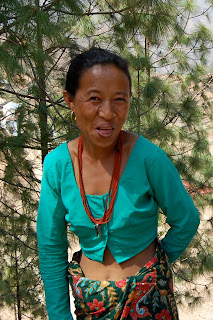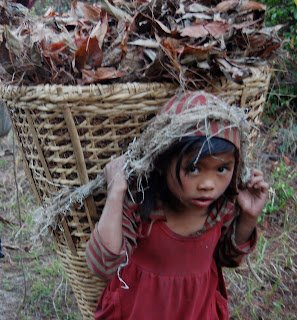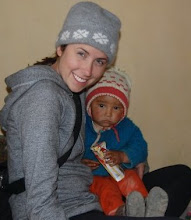
Thursday, June 3, 2010
Music is everywhere ...

Wednesday, May 26, 2010
A very special thank you ...

Now that my time in Nepal is nearing an end, I have so many people to thank for this wonderful experience. But I would like to start with the amazing people at Carleton’s Instructional Media Services and Sony Canada.
From the moment I found out I was headed to Nepal, I knew I wanted to try to shoot this documentary in high definition. And Sony was kind enough to let me take their super awesome EX1R camcorder along for the ride.
Recording in remote villages was not always easy. Having accumulated countless cuts and bruises and made it through a few precarious bouts of food poisoning, there were times when I thought ‘what the heck have I gotten myself into!?’.
But whenever I went back and watched the incredibly vivid and sharp footage, it made everything worth while. I never realized just how rewarding it would be to sit in front of a computer screen and see colours and images that look even better than what you see with your own eyes. It really is the next best thing to being there yourself. I have fallen in love with documentary filmmaking, and I have no doubt that this camera is part of the reason. It certainly was the right tool for the job. And I cannot wait to get back home and check it out on a big screen.

The very talented Mike Lundin did the shooting for this film. A self-proclaimed camera-nerd, watching him play with the EX1R was like watching a kid in a candy store. Mike has been in the film industry for the past decade and has even produced and shot a wonderful doc titled Porters of the Inca Trail. He says the camera was a pleasure to film with. Beyond the high quality lens and easy-to-navigate menu he was particularly excited about the rotating grip (a new feature that cannot be found on its predecessor, or any other similar camera so far as we can tell). It goes to show that even seemingly small design differences can make all the difference when you’re filming in the blazing sun in 40 degree weather.
Personally, I am impressed by how the camera reacts to low light. A few weeks back we got stuck in a very small village on the border of India after sunset. We needed to interview Anita, one of our main characters, but our camera light ran out of batteries. We ended up using a shotty flashlight borrowed from a local and candlelight to illuminate her face. I was so nervous it would look awful the entire time we were recording, but I think, in the end, it looked absolutely stunning. And that really is a testament to the camera.
And of course, the landscape shots. Nepal is a strikingly beautiful place, so we took full advantage of its rolling hills, majestic mountains and vast plains. We picked up a polarizer filter to help add contrast to overexposed areas. It helped tremendously, especially when recording the sky at dusk or dawn.
The fast motion function is pretty cool as well. It admittedly took a little willpower for me to refrain from shooting half the doc fast-paced. Check out the clip below of people bustling around Patan’s Durbar Square and you'll know what I mean. I just love this shot.
Transferring all the footage from the solid state media cards was much less cumbersome than carrying tapes and very easy once we got the work flow down - export through a clip browser program, import into Final Cut Pro. Voila! We transferred in the middle of the mountains, in the centre of a tiny village with no electricity for miles and even in the back of a moving jeep. Just another day at the office.
As journalists, the story is paramount. And this experience has taught me that technology can help the story along just like compelling characters and a solid focus can. Vivid images and crystal clear sound help get the message across to an audience and that’s what’s important.
Here are a few more clips. I wish I could show them to you in HD. I have had to compress them substantially. Uploading crawls along at a snails pace over here. But you'll see the real deal soon enough.
Again. A very big thank you to Sony Canada, most notably Brian Young and Penny Rutherford of Dynamix in Ottawa. This has been one of the best experiences of my life and I am so grateful for their generosity and support. I would also like to thank Tim, Bernie and Dave from Carleton's IMS department for putting up with me, even when I called them in a panic from rural Nepal! Their patience and assistance went above and beyond. When I say that this project would not have happened without them I sincerely mean it. I am very lucky.
This video clip is a rough edit of a sequence of Anita, another character in the doc. Music by Kiran Nepali, who plays the sarangi in a very famous folk band here called Kutumba.
Saturday, May 22, 2010
The festival of rain hits the capital

Here is my latest post for the Toronto Star's New Kids on the Blog.
Tuesday, May 18, 2010
A few of my favourite clips...
Monday, May 17, 2010
Top of the district to top of the charts ...
Monday, May 10, 2010
Faces of Nepal














Namaste
There is no mistaking, I am utterly smitten with Nepal.
Having just returned from an eight day trek through the majestic peaks of the Anapurna mountain range, I have become swept up in the beauty and reverence of this incredible place.
But beyond the striking scenery. And the rich bubbling history marked with temples and monuments, it’s how the Nepali people say “hello” that has me so enchanted.
“Namaste,” pronounced Nam-a-stay.
It’s a word you hear so often in Nepal it becomes as common as the frenetic sounds of car horns or motor bikes.

Photo: I remember this little boy had his hands clasped together for quite some time. I didn't realize he was waiting for me to turn around so that he could say "Namaste."
Whether you're walking the streets of Kathmandu or trekking through the mighty Himalayas, the Nepali people always have time for a heartfelt “Namaste.”
Derived from Sanskrit, the salutation is used across the country by its ethnically diverse population.
Loosely translated as “I bow to you”, small children, farmers or shop owners will place their hands, palms touching, in front of their heart. An ever so slight bow of the head comes in tandem.
It is this one simple gesture that gives me butterflies. Amidst the difficult grind of daily life and the political uncertainties currently strong-arming the nation, for me, it speaks volumes about the amicability of the Nepali people.

Photo: We had barely made it out of the car during a recent trip to Dolokha before this woman welcomed us with a customary "Namaste."
“It’s different from where you come from,” my friend Aruna, who has been helping me film here in Kathmandu joked with me recently. “Here in Nepal, we always have time to stop, to greet, to say hello.”
It is a lesson I will take with me always - as a friend, a daughter, a journalist and also a perfect stranger.
Palms touching, hands in-front-of-heart, the collective ability of the people to take a literal breath and acknowledge one another is the most beautiful thing I have seen during my time here in Nepal.
Namaste. I bow to you.
Isn't it just lovely?

Photo: I snapped this photo right before this woman greeted us with a kind "Namaste."
